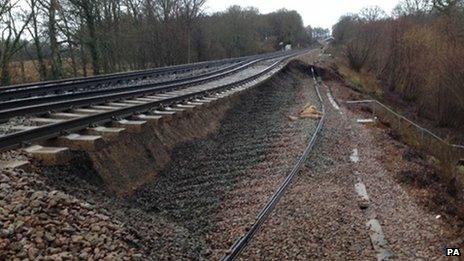UK floods: No penny pinching over help says Cameron
- Published
Ed Miliband presses David Cameron on his "money no object" pledge to clean up after the flooding
There will be "no penny pinching" when it comes to funding flood relief efforts, David Cameron has said as he announced extra financial help.
Homeowners and businesses will get grants of up to £5,000 to pay for future flood protection, he told MPs.
The prime minister has said "money would be no object" in the response.
But Labour leader Ed Miliband said he had doubts about this "grand promise" of assistance and said those still at risk needed a "speedier response".
Speaking at Prime Minister's Questions, Mr Cameron said the government would "spend whatever is necessary" on immediate support for flood-affected communities, including providing sandbags, pumping equipment and military assistance where requested.
The flood protection grants will be available to all those whose homes have been affected. More than 5,500 homes have been inundated since December.
Mr Cameron also announced a £10m package of support for waterlogged farms and said other affected businesses would be able to claim 100% tax relief on business rates for three months and be able to defer their tax payments.
"I don't want people to worry about penny pinching when they see the vital work that is needed to help them deal with their houses and help deal with the floods," he said. "That is what this government is doing."
He accused his Labour counterpart of "dividing" the Commons over the issue at a time when the country should be pulling together in the face of adversity.
'One voice'
Mr Miliband urged the government to reconsider planned cuts to the Environment Agency and said it should be spending more on flood defence in the future to make the UK more resilient.
"The government needs to speak with one voice on this issue," he said.
"The response needs to be speedier than it has been in the past and everyone affected needs to feel they are getting the help they need."
The BBC News Channel's chief political correspondent Norman Smith said some of the new assistance schemes are expected to be up and running within days and others by the end of the month.
Earlier on Wednesday, the prime minister chaired a meeting of the Cobra emergency committee on the flood crisis and will lead another meeting at 17:30 GMT.
Cameras have been allowed to film a Cobra emergency meeting for the first time
There are still 16 severe flood warnings - meaning a danger to life - in the South East and South West of England.
A No 10 spokesman said he expected the resources to pay for the relief effort to come from contingency funds within departments and elsewhere, drawing a distinction between money for "this relief effort" and the wider costs associated with rebuilding and reconstruction.
'Every resource'
Some £31m is being made available to fund resilience projects on the railway network in the south-west of England - money which has been already been announced.

Network Rail is dealing with damage to parts of the railway network
The BBC understands a further £60m could be taken from an "under-spend" in the Department of Transport's budget to fund repairs.
Transport Secretary Patrick McLoughlin said Network Rail was already spending £38bn on maintaining and enhancing the rail network over the next five years but would not comment on whether any new money would be put at his disposal.
"I don't think it's a blank cheque," he told ITV's Daybreak.
"I think what the prime minister was making very clear is that we are going to use every resource of the government, and money is not the issue while we are in this relief job."
'Bits and bobs'
The BBC's political editor Nick Robinson said Mr Cameron had used a "big phrase" to demonstrate his commitment to do whatever was necessary to help those affected but, in reality, there did not seem to be a "big cheque".
The scale of the potential economic outlay is illustrated by the fact that the floods which struck large parts of England and Northern Ireland in 2007 cost business £740m.
The committee on climate change, which advises the government on emissions targets, has suggested £500m would need to be spent to make the UK's flood defences ready for future challenges.
The UK Independence Party has called on the prime minister to give more details of where the money will come from, saying that the sums needed could run to hundreds of millions of pounds.
Nigel Farage, the party's leader, has called for money to be temporarily taken from the foreign aid budget to deal with the immediate challenges - a proposal rejected by the prime minister.
"If David Cameron is only talking about utilising a £60m transport underspend and one or two other bits and bobs from across Whitehall then he still clearly does not appreciate the terrible scale of this crisis," he said.